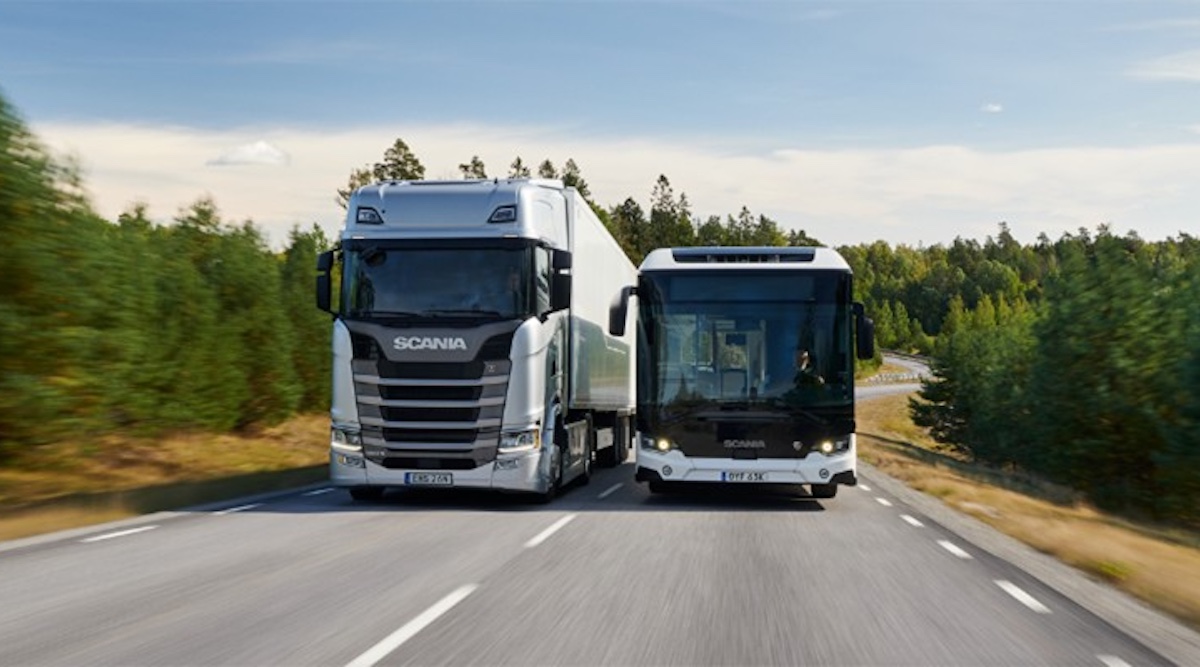Last Updated on: 2nd July 2025, 02:53 am
Swedish truck and bus manufacturer Scania has quietly but steadily grown its presence and influence across Australia, especially through its focus on sustainable transport, advanced vehicle technology, and a commitment to road safety.
In a press statement, the company announced developments that showcase a multi-faceted approach to the Australian market, addressing the needs of various sectors from public transport to heavy haulage and even autonomous mining.
Last May, the company introduced new battery-electric trucks equipped with large 624 kWh batteries. This particular model was first released in Europe in 2022 and has undergone four major technology and cosmetic upgrades, and has recently gained approval for sale in Australia.
A 500 kW motor powers the NG G Series trucks, the first of which has already made its way to the Total Logistics Solutions (TLS) fleet in Victoria. This highlights the logistics provider’s shift toward zero-emission last-mile deliveries. The 12-ton trucks (with extended range batteries) can carry a payload of 29 to 31 tonnes. The expected range is up to 350 km (~218 miles), and charging time is as little as 1 hour and a half using 375 kW DC chargers.
Electric city buses
Scania has started production of 60 new battery-electric city buses for the South Australian government to be used in Adelaide. Notably, the state uses wind and solar energy to meet over 60 percent of its local grid demand annually, peaking at 70 percent from renewables last year, making it a global leader.

“This landmark deal means Scania will support South Australia’s transition to a cleaner, more sustainable public transport network,” said Anna Ställberg, Head of Urban Solutions at Scania Group, adding that the deal will boost “our penetration of the Australian electric vehicle market.”
The new vehicles—the K-series two-axle low-entry buses—will begin delivery in November 2025. They will serve the city of Adelaide. Coachbuilder Volgren will supply the bodies built on the Scania powertrain, with seating for 43 to 45 passengers and a maximum range of over 400 kilometers (248 miles).
The buses will feature Scania’s complete suite of Advanced Driver Assistance Systems, including pedestrian recognition and lane keeping. This will enhance road safety by helping the driver maintain proper vehicle positioning while also managing speed and distance from other vehicles, cyclists, and pedestrians.
“This order is not only strategically significant for Scania; it also demonstrates the strength of our ongoing partnership with DIT,” said Steven Godbold, Contract Manager Government Bus — SA/TAS, Scania Australia, in a distributed press statement. Additional buses may be ordered until June 2029 if the South Australian government is satisfied with the initial batch of electric buses.
Adelaide Metro took delivery of Scania’s very first fully electric bus in late 2023. As its program progressed, nine more buses were built. The additional 60 buses mark South Australia’s plan to electrify its extensive 1,000-bus fleet, which currently includes 825 Scania non-electric vehicles. The electric buses may complete the lineup and could potentially replace the entire fleet by 2029, Scania insiders told CleanTechnica.
Autonomous mining transport
Scania is also exploring the frontiers of autonomous transport in Australia’s mining sector, with a long-term vision to shift to fully electric autonomous solutions.
Collaborations with companies like Regroup and Fortescue focus on developing and deploying autonomous mining truck fleets, including the world’s first fleet of autonomous in-pit mining trucks in Western Australia’s Pilbara region. These trucks are currently diesel-powered, but transitioning to clean energy sources is a priority. These initiatives aim to improve efficiency, enhance safety by reducing human exposure in hazardous environments, and minimize the environmental footprint of mining operations.
Road safety for large vehicles
Road safety remains a key focus for Scania in Australia. The company recently launched a light-hearted yet impactful campaign, “It’s not you. It’s me. I need space,” to raise awareness about safe driving practices around trucks. This initiative, supporting the Australian Road Safety Foundation’s Fatality Free Friday, uses relatable language and visuals to explain why heavy vehicles need more space for braking, turning, and reducing blind spot risks.
This campaign reinforces Scania’s broader partnership with the Australian Road Safety Foundation, aimed at encouraging safer driving behaviors and promoting safety practices that will become the new norm, even as electric vehicles become more common.
Sign up for CleanTechnica’s Weekly Substack for Zach and Scott’s in-depth analyses and high level summaries, sign up for our daily newsletter, and follow us on Google News!
Whether you have solar power or not, please complete our latest solar power survey.
Have a tip for CleanTechnica? Want to advertise? Want to suggest a guest for our CleanTech Talk podcast? Contact us here.
Sign up for our daily newsletter for 15 new cleantech stories a day. Or sign up for our weekly one on top stories of the week if daily is too frequent.
CleanTechnica uses affiliate links. See our policy here.
CleanTechnica’s Comment Policy

